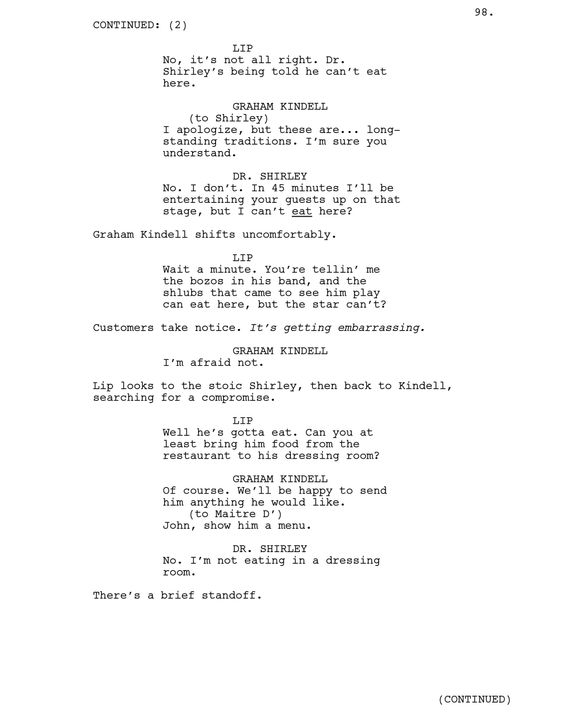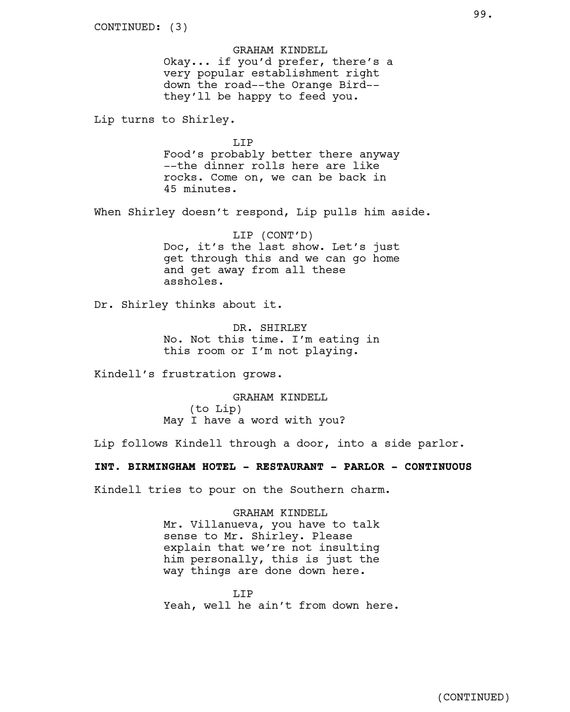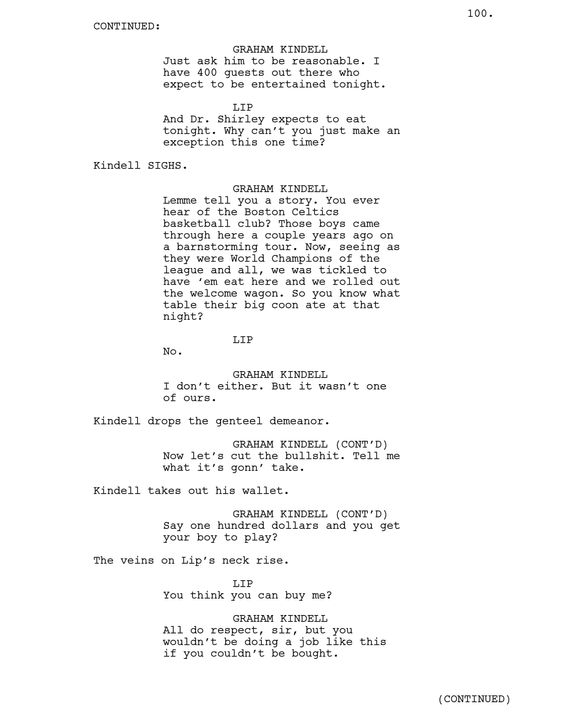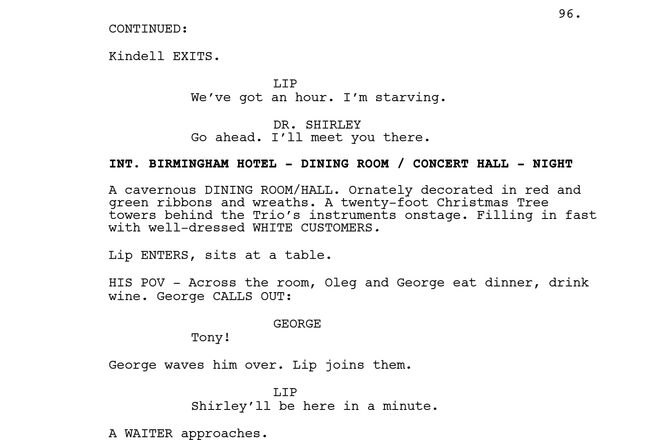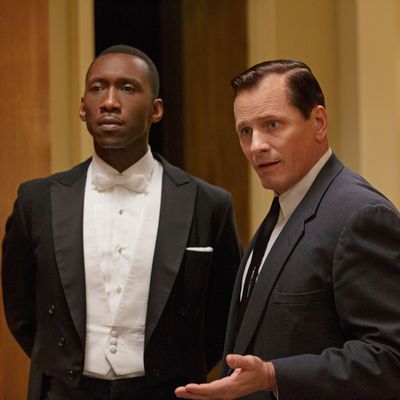
Over the next few weeks, Vulture will speak to the screenwriters of 2018’s most acclaimed movies about the scenes they found hardest to crack. Which pivotal sequence underwent the biggest transformation on the way from script to screen? Today, Green Book writer-director Peter Farrelly — who is nominated for an Academy Award for best original screenplay and whose film is up for a best picture Oscar — unpacks his difficulty plotting a key scene in which jazz/classical pianist Don “Doc” Shirley (Mahershala Ali) is turned away from a whites-only hotel dining room, putting his driver-cum-bodyguard Tony “Lip” Vallelonga (Viggo Mortensen) in a tricky situation. The scene is then excerpted below.
Early on in the trip, the Christmas concert in Birmingham, Alabama, is set up as the final destination. This is the last show. And by that point, the characters have bumped heads, they’ve had their ups and downs, and they’ve bonded. They just have to get through this last performance and Tony Lip gets paid his back-end salary. But it was also the scene where Doc Shirley has had enough. By then, he’s already been pushed around, arrested, treated poorly, and had this big come-to-Jesus moment in the rain and is talking about, “Who am I? What am I? And what do I stand for?”
So when Doc’s told he can’t eat at this restaurant — even though he’s the guy everyone there has come to see — we wanted him to stand up and finally say, “That’s it!” And it was very complicated because there’s a lot going on.
If this had happened earlier on in the movie, Tony wouldn’t have blinked. At the beginning, Tony’s a guy who’s stealing hats for money. He’s eating hot dogs for money. He’s a scammer. But now he’s walked a couple of miles in Doc Shirley’s shoes and sees it from his point of view. And he does not approve. But on the other hand, we can’t have Tony be the one to say, “No, you’re not going to play here if you can’t eat here.”
I know there’s been a lot of discussion about the white savior and the magical negro, all these different tropes. We discussed them at length with Mahershala Ali and [executive producer] Octavia Spencer — with everybody involved. We didn’t want to fall into that. And by the way, the white-savior trope is an easy trope to fall into if you take your eye off the ball. So we were very clear that we were walking a tightrope there, because we didn’t want you to think Tony Lip hadn’t learned anything and that he would be okay with Doc playing there. He shouldn’t be. He learned too much.
On the other hand, we didn’t want Tony talking him out of it. It has to come from Doc Shirley. He says, “I’m not playing here unless I get to eat in this room.” And he’s not going back on that. But if Doc Shirley just insists they leave, they’re back where they started — he’s going against Tony. So it has to be a mutual decision. That made it a difficult scene to do: to make sure that Doc Shirley made the decision while allowing Tony to save face and to show that Tony Lip has grown.
So my co-writers, Brian Currie and Nick Vallelonga, and I went around and around in circles. In New Orleans, about six weeks before the cameras rolled, that was one scene we rewrote with Mahershala. We had a draft early on where Doc Shirley is pissed that they won’t let him in the restaurant. And he wants to leave. But then he realizes Tony is going to lose money and recognizes it. Tony says, “Come on Doc.” He goes, “This is the last show. I’m gonna lose my back end.” And Doc Shirley is torn on it. So he says, “Okay, all right, let’s play.” And Tony’s conscience hits him and he realizes what he’s doing is wrong.
In that early draft, as Doc Shirley’s about to go onstage, Tony grabs him and says, “No, I don’t give a fuck. You’re not doing this. This is wrong.” And Doc Shirley smiles because he is proud of Tony. But the problem was, it was Tony’s decision and we didn’t want that.
Mahershala never used the term “white savior.” But he said, “This isn’t right.” He goes, “Tony can’t be the one. This must be my decision. I’m the one calling the shots here. Doc Shirley wouldn’t play there.” When he brought it up, I immediately realized, “Oh, yeah, that is fucked up. What he’s saying is exactly correct.” It was never a debate.
But that created another problem: If it’s all Doc Shirley, then you look at Tony and go, What an asshole. He didn’t learn anything through all this time. So Brian, Nick, and I had to find a way to make it Doc Shirley’s decision, allowing Tony to piggyback on it, to show they’re both in sync at the end. They have to both agree. It’s not one convincing the other.
I know it’s pathetic, but one of my favorite shows of all time is The Andy Griffith Show. Andy was the God figure. Andy was smart and forgiving. Andy never made decisions for people. He let people make their own decisions, but he led them to their decisions. He helped people grow without saying, “Hey, Barney, you should do this or that.” He let Barney learn with a gentle touch. And in this scene, that is what Doc Shirley is doing.
So in the final scene, we worked out a balancing act. Tony is about to punch the maître d’. And Doc stops him and says, “Tony, I’ll play … if you want me to.” But he knows Tony’s not going to want him to, even though Tony’s going to lose his back end by not playing the thing. And Tony is willing to walk away from the money at the end because he has grown.
The integrity of the characters was the most important thing to us. Listen, I wasn’t avoiding the white-savior trope because I don’t want to be criticized for the white-savior trope. I didn’t want it because it’s been done a million times and it’s the wrong thing to do. It also steals integrity from the black character. It steals character from the black character. It wasn’t like, Ooh they’re gonna criticize us for that. They should criticize us if we do that!
What I’ve learned over the years is that no script you write is going to be 100 percent perfect. You have to open your eyes to its flaws. Give it to good readers. Have a really creative producer and trust your actors. Now that doesn’t mean you do everything they come up with or else it gets muddy. But listen and keep your heart open to ideas. Because if you think you know everything, it’s never going to be as good as it can be. If you open your heart and let other ideas come in, then you’re allowing the universe to come in and take hold. And then it becomes something special.
Now see how the scene plays out in the finished film:
Below, read the scripted version of the scene:



